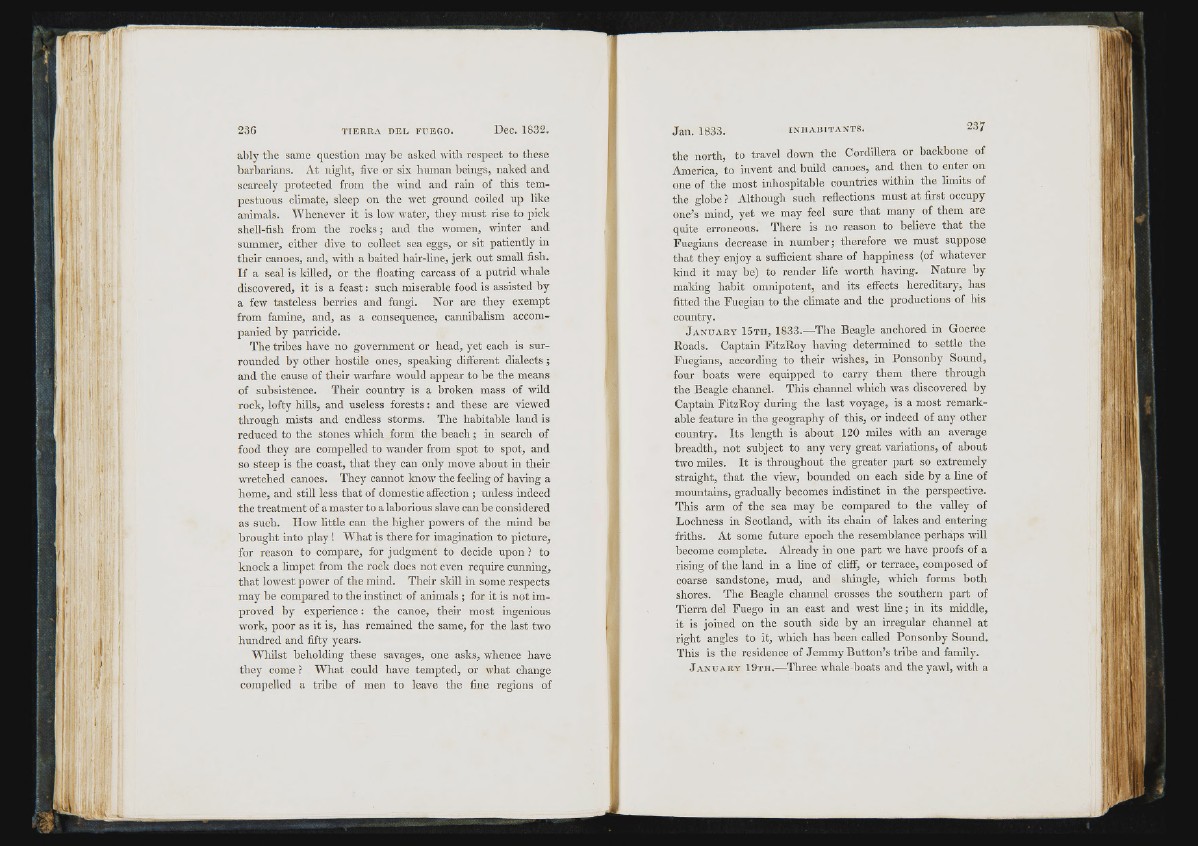
ü,r
' r ft (i
i
ably the same question may lie asked with respect to these
barbarians. At night, five or six human beings, naked and
scarcely protected from the wind and rain of this tempestuous
climate, sleep on the wet ground coiled up like
animals. AAHienever it is low water, they must rise to pick
shell-fish from the rocks; and the women, winter and
summer, either dive to collect sea eggs, or sit patiently in
their canoes, and, with a baited hair-line, jerk out small fish.
If a seal is killed, or the floating carcass of a putrid whale
discovered, it is a feast: such miserable food is assisted by
a few tasteless berries and fungi. Nor are they exempt
from famine, and, as a consequence, cannibalism accompanied
by parricide.
The tribes have no government or head, yet each is surrounded
by other hostile ones, speaking different dialects;
and the cause of their warfare would appear to be the means
of subsistence. Their country is a broken mass of wild
rock, lofty hills, and useless forests: and these are viewed
through mists and endless storms. The habitable land is
reduced to the stones which form the beach; in search of
food they are compelled to wander from spot to spot, and
so steep is the coast, that they can only move about in their
wretched canoes. They cannot know the feeling of having a
home, and still less that of domestic affection ; unless indeed
the treatment of a master to a laborious slave can be considered
as such. How little can the higher powers of the mind be
brought into play ! AA’hat is there for imagination to picture,
for reason to compare, for judgment to decide upon ? to
knock a limpet from the rock does not even require cunning,
that lowest power of the mind. Their skill in some respects
may be comjiared to the instinct of animals; for it is not improved
by experience: the canoe, their most ingenious
work, poor as it is, has remained the same, for the last two
hundred and fifty years.
AAHiilst beholding these savages, one asks, whence have
they come ? AVhat could have tempted, or what change
compelled a tribe of men to leave the fine regions of
the north, to travel down the Cordillera or backbone of
America, to invent and build canoes, and then to enter on
one of the most inhospitable countries within the limits of
the globe ? Although such reflections must at first occupy
one’s mind, yet we may feel sure that many of them are
quite erroneous. There is no reason to believe that the
Fuegians decrease in number; therefore we must suppose
that they enjoy a sufficient share of happiness (of whatever
kind it may be) to render life worth having. Nature by
making habit omnipotent, and its effects hereditary, has
fitted the Fuegian to the climate and the productions of his
country.
J a n u a r y 1 5 t i i , 1 8 3 3 .— The Beagle anchored in Goeree
Roads. Captain FitzRoy having determined to settle the
Fuegians, according to their wishes, in Ponsonby Sound,
four boats were equipped to carry them there through
the Beagle channel. This channel which was discovered by
Captain FitzRoy during the last voyage, is a most remarkable
feature in the geography of this, or indeed of any other
country. Its length is about 1 2 0 miles with an average
breadth, not subject to any very great variations, of about
two miles. It is throughout the greater part so extremely
straight, that the view, bounded on each side by a line of
mountains, gradually becomes indistinct in the perspective.
This arm of the sea may be compared to the valley of
Lochness in Scotland, with its chain of lakes and entering
friths. At some future epoch the resemblance perhaps will
become complete. Already in one part we have proofs of a
rising of the land in a line of cliff, or terrace, composed of
coarse sandstone, mud, and shingle, which forms both
shores. The Beagle channel crosses the southern part of
Tierra del Fuego in an east and west line ; in its middle,
it is joined on the south side by an irregular channel at
right angles to it, which has been called Ponsonby Sound.
This is the residence of Jemmy Button’s tribe and family.
- J a n u a r y 1 9 t h .— T h r e e w h a l e b o a t s a n d t h e y a w l , w i t h a